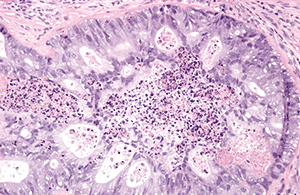Main navigation
The Ophthalmic Pathology fellowship at the University of Iowa is a one-year pre- or post-residency fellowship emphasizing both clinical and research training and is based in the Department of Ophthalmology and Visual Sciences.
Program Objectives
- Interpret a wide range of ocular specimens through hands-on lab experience
- Participate in daily case sign-outs and frozen section evaluations.
- Complete and present a research project at the annual Residents’ and Fellows’ Research Day
- Assist in teaching first-year ophthalmology residents and contribute to educational sessions and lectures.
- Attend regular morning rounds and conferences to enhance clinical knowledge.
Clinical Expertise
The clinical component provides a broad experience in the field of ophthalmic pathology. The F.C. Blodi Eye Pathology Laboratory has a long tradition at the University of Iowa. We are the only ophthalmic pathology laboratory in Iowa and are a referral center for surrounding areas. The laboratory volume is about 800 clinical specimens per year.
Clinical responsibilities in the Eye Pathology Laboratory are geared toward the fellow. There is always a first year ophthalmology resident rotating through the laboratory, however, their primary role is one devoted to learning. The fellow would be expected to participate in gross and microscopic examination of all types of specimens received in the lab and in daily sign out of the cases. The fellow will also assist with resident teaching and lectures. There is no formal call duty for nights and weekends for the fellow. The fellow may be responsible for frozen section call as needed.
Engage in Research
Each ophthalmology fellow is expected to complete a research project based on clinical or laboratory experience. Research is usually performed within the department, but can take place in another department or, occasionally, at another institution. The research interests of the faculty are varied, and many projects are in progress. Presentations of research are made annually during the Resident/Fellow Research Conference at the end of the academic year. The P.J. Leinfelder Award is given annually by a faculty committee to the fellow who has made the most significant contributions in preparing and delivering their research.
- Visit our most recent Resident/Fellow Research Day program for examples of typical areas of research interest.
- About the F.C. Blodi Eye Pathology Laboratory
- About the University of Iowa Institute for Vision Research
Historically, research training in eye pathology has been mostly of a clinical nature. The fellow is expected to undertake and complete a research project during the year to be presented at the annual Residents' and Fellows' Day in the Spring. Additionally, there is the opportunity to assist with ongoing research projects.
Read about the case from which these images are derived at Tantri A, Syed AN, Weingeist TA. Metastatic Choroidal Lesion: 61 y.o. man presents with pain and blurry vision OD. EyeRounds.org. March 9, 2005; Available http://eyerounds.org/cases/35-metastaticlungCA.htm.


Training and Education
The Department of Ophthalmology at the University of Iowa has a unique, superlative teaching program. Morning rounds are held Monday through Thursday during the week from 8:00 to 8:45 a.m. These are attended by all faculty, fellows, and residents and consist of patient presentations, seminars, and interesting discussions. There are also afternoon conferences in pathology, neuro-ophthalmology, and retina on a weekly basis. Every Friday morning during the academic year faculty members present a two-hour lecture covering sections of the Basic and Clinical Sciences course subject material.
Board Certification Requirements
While Ophthalmology, as a specialty, is board certified, Ophthalmology subspecialty fellowships are not board certified. Visit the American Board of Ophthalmology for specifics on board certification requirements.
Salary and Benefits Summary
- Competitive Stipends
- Comprehensive medical, dental, hospitalization and pharmacy benefits for residents/fellows and their dependents
- Vacation each year: 3 weeks, for specific information Paid Time Off and Leave Information
